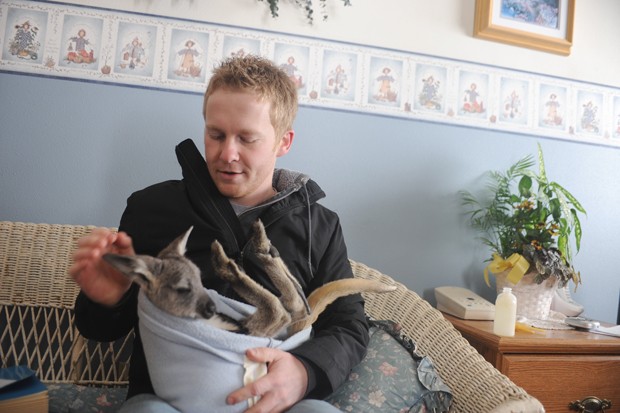One recent University of Minnesota graduate has created his very own land down under in MinnesotaâÄôs farmland, replete with kangaroos, an emu and an exotic bird collection. Christian Lilienthal graduated from the UniversityâÄôs College of Food and Agricultural Sciences with an agricultural education degree last year. He now runs an animal oasis at his family farm in Arlington, Minn., 60 miles southwest of the Twin Cities. LilienthalâÄôs mob of kangaroos came from a larger exotic animal ranch in South Dakota, which downsized and sent the kangaroos his way in January. Neither the Como Zoo in St. Paul nor the Minnesota Zoo in Apple Valley house kangaroos. Most of the kangaroos live in a pen outside. Lurch, a 12-year-old emu, lives next door. Stroll further down this animal avenue and youâÄôll meet Dalai Llama âÄî a fatherâÄôs day gift to LilienthalâÄôs father. There are also the peacocks âÄî some albino âÄî who neighbor the red-golden pheasants. Lilienthal said the animals adapt pretty easily to Minnesota winter. The kangaroos that live outside rely on heating pads and a heating lamp to stay warm. Some of them, however, get prime indoor real estate. Rocky the wallaby lives in his own pen in LilienthalâÄôs fatherâÄôs fur workshop. Previously, Rocky lived with Lilienthal in his St. Paul apartment during his last few months at the University. Lilienthal said he would even walk around Northrop Mall with Rocky during that time. âÄúHeâÄôll grab your arm and he wonâÄôt ever let off of you because he just wants to lick your finger,âÄù Lilienthal said. Currently, Baby Bindi gets the most attention. The 8-month-old kangaroo lives in the LilienthalsâÄô home, where she sleeps upside down in a bag-like pouch. Lilienthal said he can just âÄúhang her on the doorknobâÄù and leave her for hours. âÄúAll she is is feet and tail and ears,âÄù Lilienthal said. Lilienthal speaks with expertise and authority in describing the biology and behavior of his pets. He said he learns most from researching ahead of time for the animals he wants to acquire. Nevertheless, Lilienthal said, âÄúyou kind of have to end up being your own expertâÄù with unorthodox pets like his. In addition to caring for the kangaroos, more than 20 peacocks, two dogs, a llama and an emu, Lilienthal helps his family manage Lilienthal Farm, which profits mainly from cattle and crops. LilienthalâÄôs mother, Nelva Lilienthal, said her sonâÄôs passion for animals came early. âÄúWhen he was probably 12 or 13, I think he got a peacock or a fancy pheasant of some kind from his aunt and uncle for his birthday,âÄù she said. From there, Lilienthal got involved with the 4-H agricultural organization and with buying and showing more birds. Now the 4-H club comes to Lilienthal Farm for tours, Nelva said. âÄúHe really enjoyed it, and we had the space and stuff for it,âÄù Nelva said. âÄúItâÄôs a learning experience for him.âÄù Living on the family farm has played a role in LilienthalâÄôs animal expertise as well. âÄúWe always had peacocks running around outside when I was little,âÄù he said, though the most exotic animals have been acquired more recently. Lilienthal acquired his interest and knowledge in kangaroos from an experience at a zoo in Australia during a study abroad program. âÄúThereâÄôs a lot of things you just canâÄôt ask questions about,âÄù he said. âÄúYou just have to experience it.âÄù Owning âÄúwild, exotic, dangerous or non-domestic animal[s]âÄù is against the law in Minneapolis, according to city ordinances, but because he was not profiting from them, Lilienthal did not need a U.S. Department of Agriculture permit to own the animals in Arlington. Now, however, he does need USDA approval, as he is looking to âÄúmake a business out of keeping [the animals]âÄù through speeches to educational and interest groups. âÄúBefore I can start being hired to do programs or to speak or anything like that, I have to have this permit,âÄù Lilienthal said. The USDA classifies exotic pet owners as exhibitors, brokers or breeders, Lilienthal explained. Lilienthal expects his exhibitorâÄôs license to arrive in the next couple of weeks. With this educational programming, Lilienthal hopes to merge his love for animals with his agricultural education degree. âÄúIâÄôm pretty good at achieving my goals,âÄù he said. âÄúItâÄôs not easy to come across kangaroos, but I figured that out.âÄù
Kangaroos kick it in Minnesota snow
A 2009 University graduate has since acquired a plethora of unusual pets at his family farm.

Image by Marija Majerle
University alumnus Christian Lilienthal pets his eight-month old kangaroo Bindi Sunday at his family farm in Arlington, MN. Lilienthal hopes to utilize his agricultural education degree by using his exotic pets for educational purposes.
Published February 9, 2010
0

